This is, for now, the last post on our testing with various pumps, we hope to soon have others to compare with these tests. Today we talk about the Tunze Silence, and in particular 1073.020, 1073.040, and 1073.050. All in accordance to what you can read in our introduction: Return Pumps: tests and real measurements compared
Tunze Silence 1073.020
His technical characteristics are:
- Pump Output: 2.400 l/h
- Delivery Head: 2,00 m
- Power Consumption: 30 w
- Dimensions: 118x94x75 mm
here with all the pieces that compose it.
Our test began literally in my garage, where we tested all pumps we have received, not only this, in a single session.
Delivery Head Test
The first test we did was to measure the delivery head. The test is very simple to accomplish. We dropped the pump into a bucket full of water, we connected the pump to a garden hose plastic held vertically, and we measured the height reached by the water column from the ground. We then removed the height of water in the bucket, given that the delivery head is the distance between the two levels of water.
Let me point out that, contrary to what one might think, the level in the pipe was not fixed, but fluctuated noticeably.
So for Tunze Silence 1074.020 we read 220 cm – 20 cm = measured delivery head 200 cm (200 cm declared)
Pump Output Test
Measure the pump output is however very complex and the result was only approximate but still useful for comparing similar pumps. Placing in fact a pump in a container, its output was affected too much from the prevalence present in the bucket itself, and thus the decreasing the water in the container fell also the output. In any case, we measured the time it took each pump to fill a 12 liter tank, and run 3 measures was averaged, and then we divided the time obtained by 12 liters, resulting in a capacity not perfect, but significant, especially for the comparison.
To fill the tank up to 12 liters to Tunze Silence 1074.020 took an average of 30,4 seconds.
The output with this simple calculation reported a flow rate equal to 1.420 l/h (against the 2.400 declared). As mentioned in the introduction, this number is misleading because the test was conducted in an unscientific manner, but we will measure everything with a calibrated instrument, as we report later in the article.
Test of Power Consumption
During the test of delivery head we also measured the power consumption with current clamp, but as it was also impossible to measure the power factor, the offset between the real and apparent power, the result is only and exclusively as a curiosity.
Consumption at maximum delivery head: 0.243 amps or 53 watts versus 30 watts declared.
At this point we wondered if we could do more, and for this we came to meet the Sicce, thanks to Federico Carraro, has made available all its instruments of measurement.
We should note however that all the measurements made in Sicce were performed with a supply current at 230V as standard of measurement in Europe, so keep in mind when you read these results.
But we have to point that we have tested all pumps with all their protections like they’re in the first picture, if we take out the protections, we have better values
 |
 |
| Measured delivery head: 195 cm (declared 200 cm) | Measured output: 1.860 l/h (declared 2.400) at 4 cm |
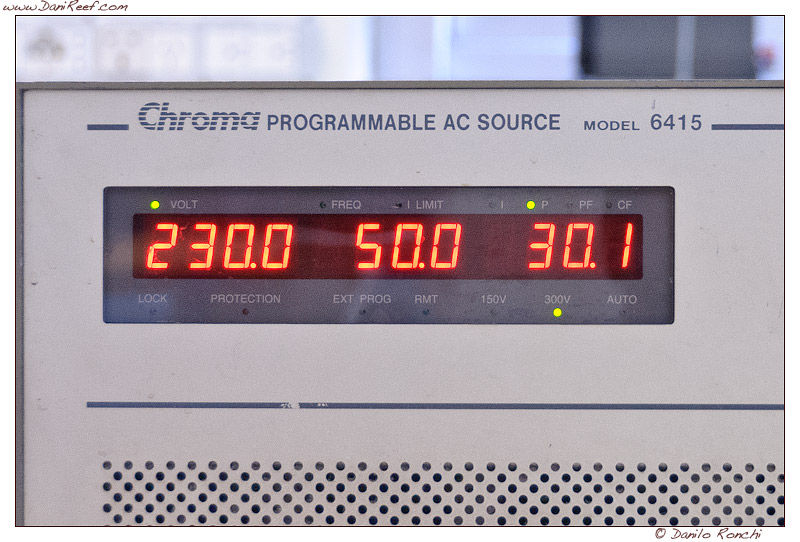 |
 |
 |
| Power Consumption at maximum delivery head: 30.1 watt (declared 30 watt) |
Power Factor = 0,478 | Absorbed current: 0,27 A |
Please note: the measured head has to be corrected by adding 20 cm which is the value read by the system when pump is off.
Output measured at 150 cm of delivery head: 691 l/h.
 |
 |
 |
| Power Consumption at 150 cm: 21,0 watt | Power Factor = 0,353 | Absorbed current: 0,25 A |
Tunze Silence 1073.040
His technical characteristics are:
- Pump Output: 3.000 l/h
- Delivery Head: 3,0 m
- Power Consumption: 42 w
- Dimensions: 118x94x75 mm
here with all the pieces that compose it
Our test began literally in my garage, where we tested all pumps we have received, not only this, in a single session.
Delivery Head Test
The first test we did was to measure the delivery head. The test is very simple to accomplish. We dropped the pump into a bucket full of water, we connected the pump to a garden hose plastic held vertically, and we measured the height reached by the water column from the ground. We then removed the height of water in the bucket, given that the delivery head is the distance between the two levels of water.
Let me point out that, contrary to what one might think, the level in the pipe was not fixed, but fluctuated noticeably.
So for Tunze Silence 1073.040 we read 311 cm – 20 cm = measured delivery head 291 cm (300 cm declared)
Pump Output Test
Measure the pump output is however very complex and the result was only approximate but still useful for comparing similar pumps. Placing in fact a pump in a container, its output was affected too much from the prevalence present in the bucket itself, and thus the decreasing the water in the container fell also the output. In any case, we measured the time it took each pump to fill a 12 liter tank, and run 3 measures was averaged, and then we divided the time obtained by 12 liters, resulting in a capacity not perfect, but significant, especially for the comparison.
To fill the tank up to 12 liters to Tunze Silence 1073.040 took an average of 23,4 seconds.
The output with this simple calculation reported a flow rate equal to 1.846 l/h (against the 3.000 declared). As mentioned in the introduction, this number is misleading because the test was conducted in an unscientific manner, but we will measure everything with a calibrated instrument, as we report later in the article.
Test of Power Consumption
During the test of delivery head we also measured the power consumption with current clamp, but as it was also impossible to measure the power factor, the offset between the real and apparent power, the result is only and exclusively as a curiosity.
Consumption at maximum delivery head: 0.108 amps or 24 watts versus 42 watts declared.
At this point we went to Sicce, where, thanks to Federico Carraro, we have had available all its instruments of measurement.
We should note however that all the measurements made in Sicce were performed with a supply current at 230V as standard of measurement in Europe, so keep in mind when you read these results.
But we have to point that we have tested all pumps with all their protections like they’re in the first picture, if we take out the protections, we have better values
 |
 |
| Measured delivery head: 285 cm (declared 300 cm) | Measured output: 2.463 l/h (declared 3.000) at 4 cm |
 |
 |
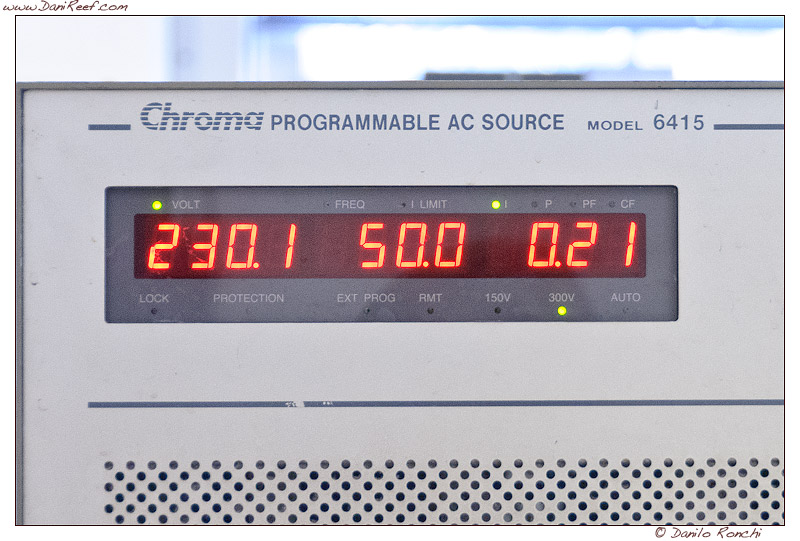 |
| Power Consumption at maximum delivery head: 44.0 watt (declared 42 watt) |
Power Factor = 0,909 | Absorbed current: 0,21 A |
Please note: the measured head has to be corrected by adding 20 cm which is the value read by the system when pump is off
Output measured at 152 cm of delivery head: 1.519 l/h.
 |
 |
 |
| Power Consumption at 152: 34,5 watt | Power Factor = 0,892 | Absorbed current: 0,17 A |
Tunze Silence Electronic 1073.050
His technical characteristics are:
- Pump Output: 3.000 l/h
- Delivery Head: 3,9 m
- Power Consumption: 43 w
- Dimensions: 118x94x75 mm
here with all the pieces that compose it.
This pump is a very special since it’s an electronic pump, which operates at 18V or 24V according to a switch, so it’s a DC pump, and you can vary the flow rate by a potentiometer, according to your needs. So besides the inherent security that can give you a pump that operates at low voltage, there is the convenience of being able to adjust the outflow according to needs, a feature that is not to be underestimated. We then matched to the test with much more curiosity than usual
Our test began literally in my garage, where we tested all pumps we have received, not only this, in a single session.
Delivery Head Test
The first test we did was to measure the delivery head. The test is very simple to accomplish. We dropped the pump into a bucket full of water, we connected the pump to a garden hose plastic held vertically, and we measured the height reached by the water column from the ground. We then removed the height of water in the bucket, given that the delivery head is the distance between the two levels of water.
Let me point out that, contrary to what one might think, the level in the pipe was not fixed, but fluctuated noticeably.
So for Tunze Silence Electronic 1073.050 we have read 328 cm – 20 cm = measured delivery head 308 cm (390 cm declared)
Pump Output Test
Measure the pump output is however very complex and the result was only approximate but still useful for comparing similar pumps. Placing in fact a pump in a container, its output was affected too much from the prevalence present in the bucket itself, and thus the decreasing the water in the container fell also the output. In any case, we measured the time it took each pump to fill a 12 liter tank, and run 3 measures was averaged, and then we divided the time obtained by 12 liters, resulting in a capacity not perfect, but significant, especially for the comparison.
To fill the tank up to 12 liters to Tunze Silence Electronic 1073.050 took an average of 25,9 seconds.
The output with this simple calculation reported a flow rate equal to 1.666 l/h (against the 3.000 declared). As mentioned in the introduction, this number is misleading because the test was conducted in an unscientific manner, but we will measure everything with a calibrated instrument, as we report later in the article.
Test of Power Consumption
During the test of delivery head we also measured the power consumption with current clamp, but as it was also impossible to measure the power factor, the offset between the real and apparent power, the result is only and exclusively as a curiosity.
Consumption at maximum delivery head: 0,136 amps or 30 watts versus 43 watts declared.
At this point we went to Sicce, where, thanks to Federico Carraro, we have had available all its instruments of measurement.
We should note however that all the measurements made in Sicce were performed with a supply current at 230V as standard of measurement in Europe, so keep in mind when you read these results.
But we have to point that we have tested all pumps with all their protections like they’re in the first picture, if we take out the protections, we have better values
 |
 |
| Measured delivery head: 305 cm (declared 390 cm) | Measured output: 2.143 l/h (declared 3.000) at 8 cm |
 |
 |
 |
| Power Consumption at maximum delivery head: 38.8 watt (declared 43 watt) |
Power Factor = 0,349 | Absorbed current: 0,48 A |
Please note: the measured head has to be corrected by adding 20 cm which is the value read by the system when pump is off.
And finally here is the summary data of Tunze pumps:
Delivery Head
| pump | delivery head | garage test | laboratory test | average | deviation |
| Tunze Silence 1073.020 | 200 | 200 | 195 | 198 | 99 % |
| Tunze Silence 1073.040 | 300 | 291 | 285 | 288 | 96 % |
| Tunze Silence Electronic 1073.050 | 390 | 308 | 305 | 307 | 79 % |
The measure of the prevalence was been strange, the excellent performance of the two pumps, the 1073.020 and 1073.040 which are practically adherent to the declared value, and the electronic pump, 1073.050 there has negatively surprised us. While remaining very interesting regardless of the results obtained, we measured a decrease in performance compared to data declared by 21%.
Output
| pump | declared output | laboratory test | deviation |
| Tunze Silence 1073.020 | 2.400 | 1.860 | 78 % |
| Tunze Silence 1073.040 | 3.000 | 2.463 | 82 % |
| Tunze Silence Electronic 1073.050 | 3.000 | 2.143 | 71 % |
The flow measurement has left us a little ‘with a bitter taste, given that all three pumps have shown results below the declared value, but still is 1073.050 with a negative -29%. We must say however that the measurements were performed with all the protections over the pumps, as in the photos, while removing them we have verified that the performance would increase a lot, a good advice in case of use in sump.
Power Consumption
| pump | declared power consumption | laboratory test | deviation | Annual cost (0,26€/kwh) |
| Tunze Silence 1073.020 | 30 | 30,1 | 100 % | 68,56 € |
| Tunze Silence 1073.040 | 42 | 44 | 105 % | 100,21 € |
| Tunze Silence Electronic 1073.050 | 43 | 38,8 | 90 % | 88,37 € |
The measurement of power consumption was been very good, especially for the 1073.050 shown power consumption less than 10% compared with the declared data. Perhaps to some problems in the potenziometer could not reach 100% and hence the performance, only for this reason you could get a 11% improvement in performance.
Measured data at 150 cm
| pump | delivery head (cm) |
output (l/h) |
Power consumption (w) |
Annual cost (0,26€/kwh) |
efficiency (liters for euro) |
| Tunze Silence 1073.020 | 150 | 691 | 21 | 47,83 € | 14,45 litres |
| Tunze Silence 1073.040 | 152 | 1.519 | 34,5 | 78,58 € | 19,33 litres |
| Tunze Silence Electronic 1073.050 |
The measurements made at 150 cm are indicative of a range that we have in our tanks, both as regards the output, the power consuption and the cost, calculated here at 0.26 euros per kwh, everyone can divide that value by 0.26 and re-multiply for the value we currently pay.
The last column then returns a value indicative of the efficiency. That is how many liters a day we can move with one euro of electricity per year. Therefore the higher the number the better the performance.
Better efficiency is from 1073.040, with great 19,33 liters for euro.
Correspondence with declared data
Finally, just as a comparison, we give a matching value compared to data reported by the various pumps
| pump | delivery head | output | Power consumption | Average |
| Tunze Silence 1073.020 | 99 % | 78 % | 100 % | 92 % |
| Tunze Silence 1073.040 | 96 % | 82 % | 105 % | 91 % |
| Tunze Silence Electronic 1073.050 | 79 % | 71 % | 90 % | 87 % |
Putting together all the data we see that pros and cons to level out and all three pumps riding a result of 90%, with only 1073.050 down to 87% of the declared values. We can however say that the two 10730.020 1073.040 adhere to the declared data, since a 10% tolerance is certainly due, the 1073.050 it’s a little disappointed.
Before publishing this test we have contacted the Tunze to understand where the problem was with the electronic pump, they too were surprised by this performance and promised to get us an additional pump to try. Thus, we stay on hold.
At this point we can promote the two pumps with honors 1073.020 and 1073.040, and wait to try another electronic pump 1073.050. You can see all three pumps in the next image.
Many thanks to Tunze for providing us the pumps subject of tests, and Sicce for the provision of the laboratory where the tests were performed.












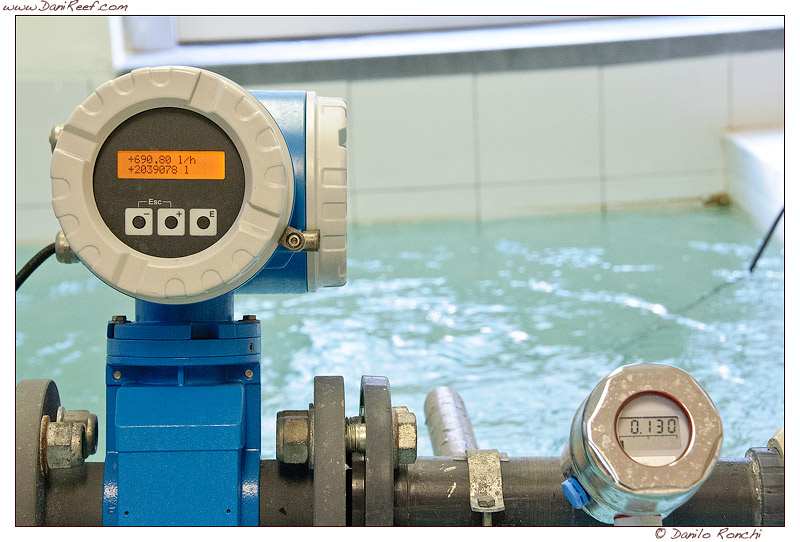











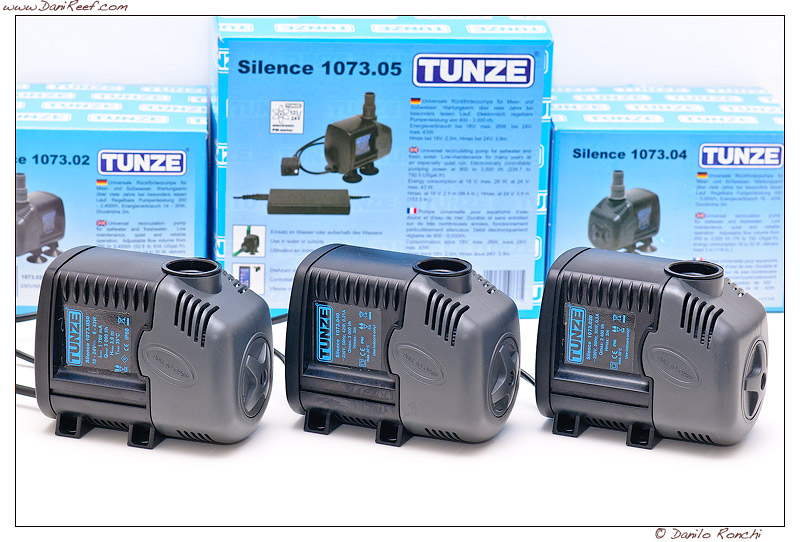
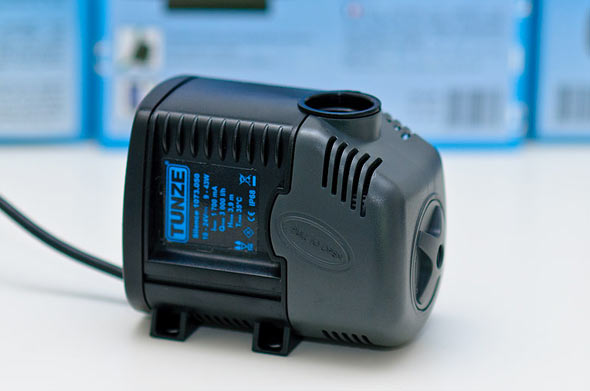

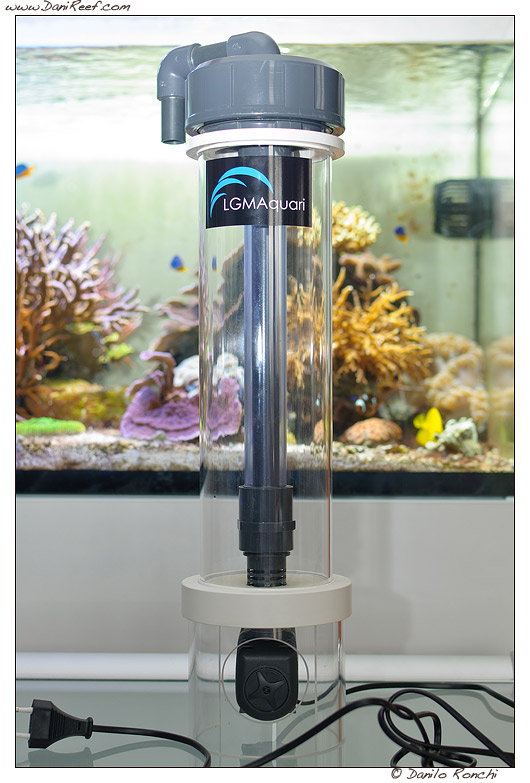



[…] If you want to read what we tested, like we had done and especially what we got, you can do so by reading the following article: Tunze Silence pumps 1073.020 – 1073.040 – 1073.050: The Total Comparative Test […]
[…] If you want to read what we tested, as we had done and especially what we got, you can do so by reading the following article: Tunze Silence pumps 1073.020 – 1073.040 – 1073.050: The Total Comparative Test […]